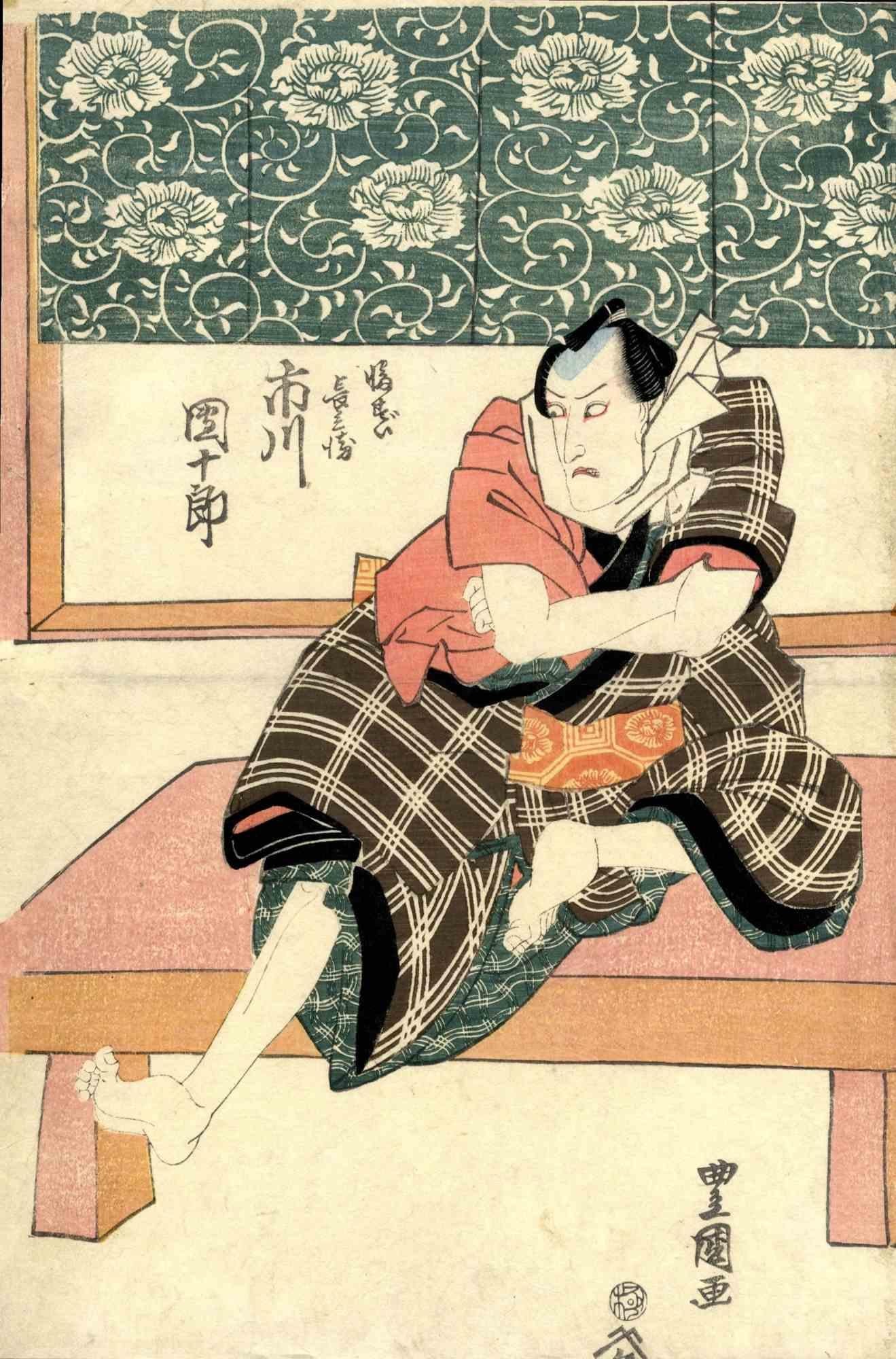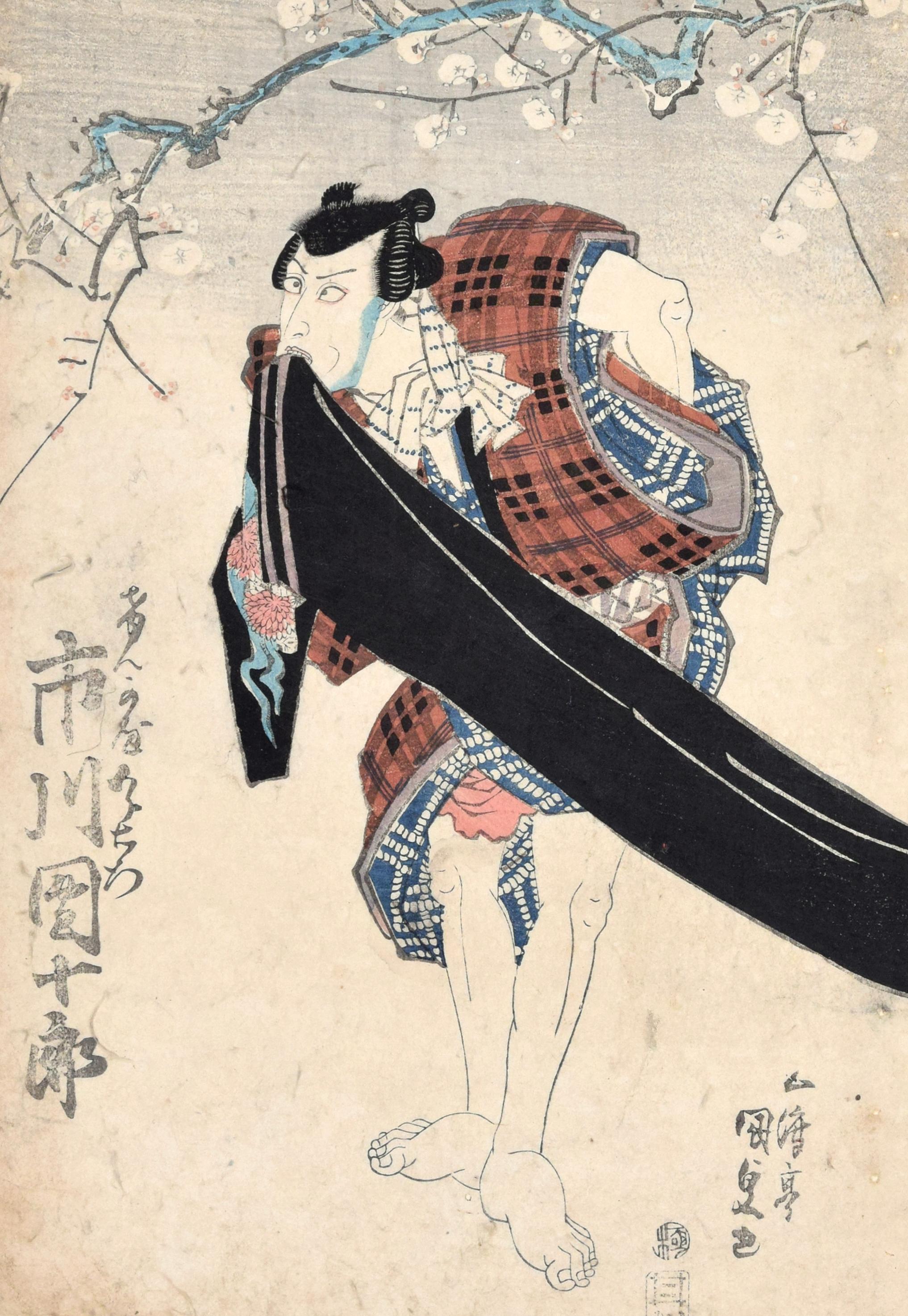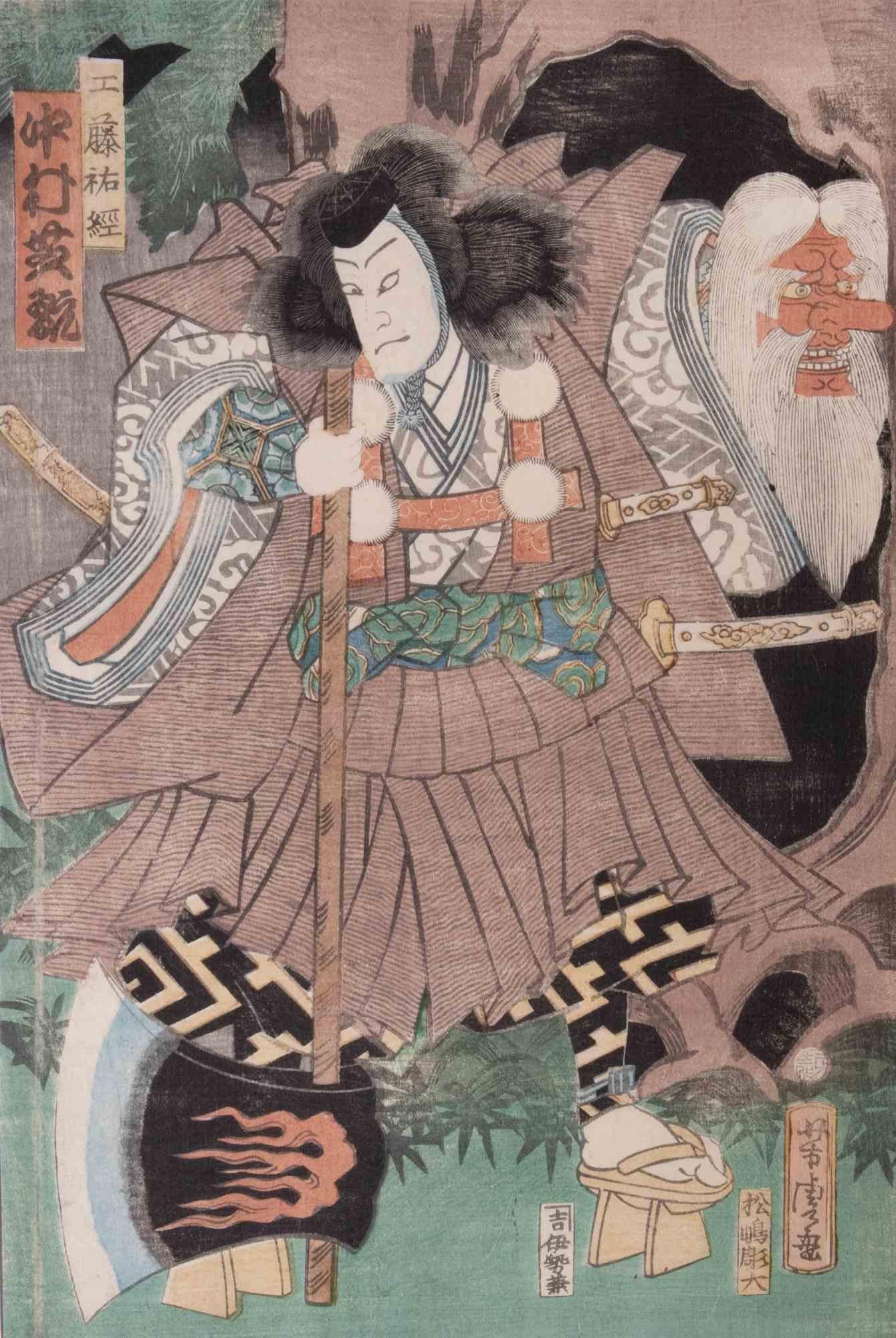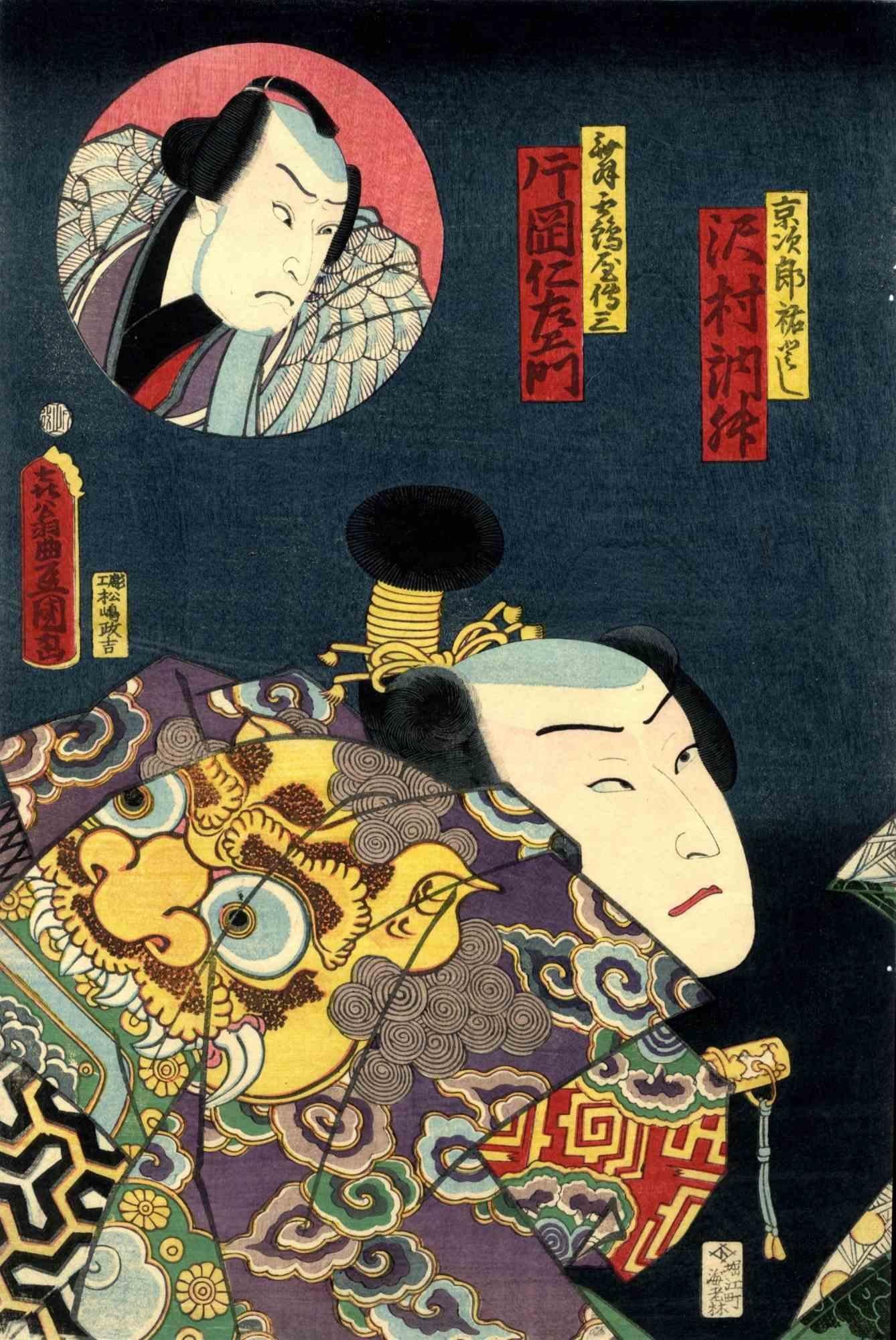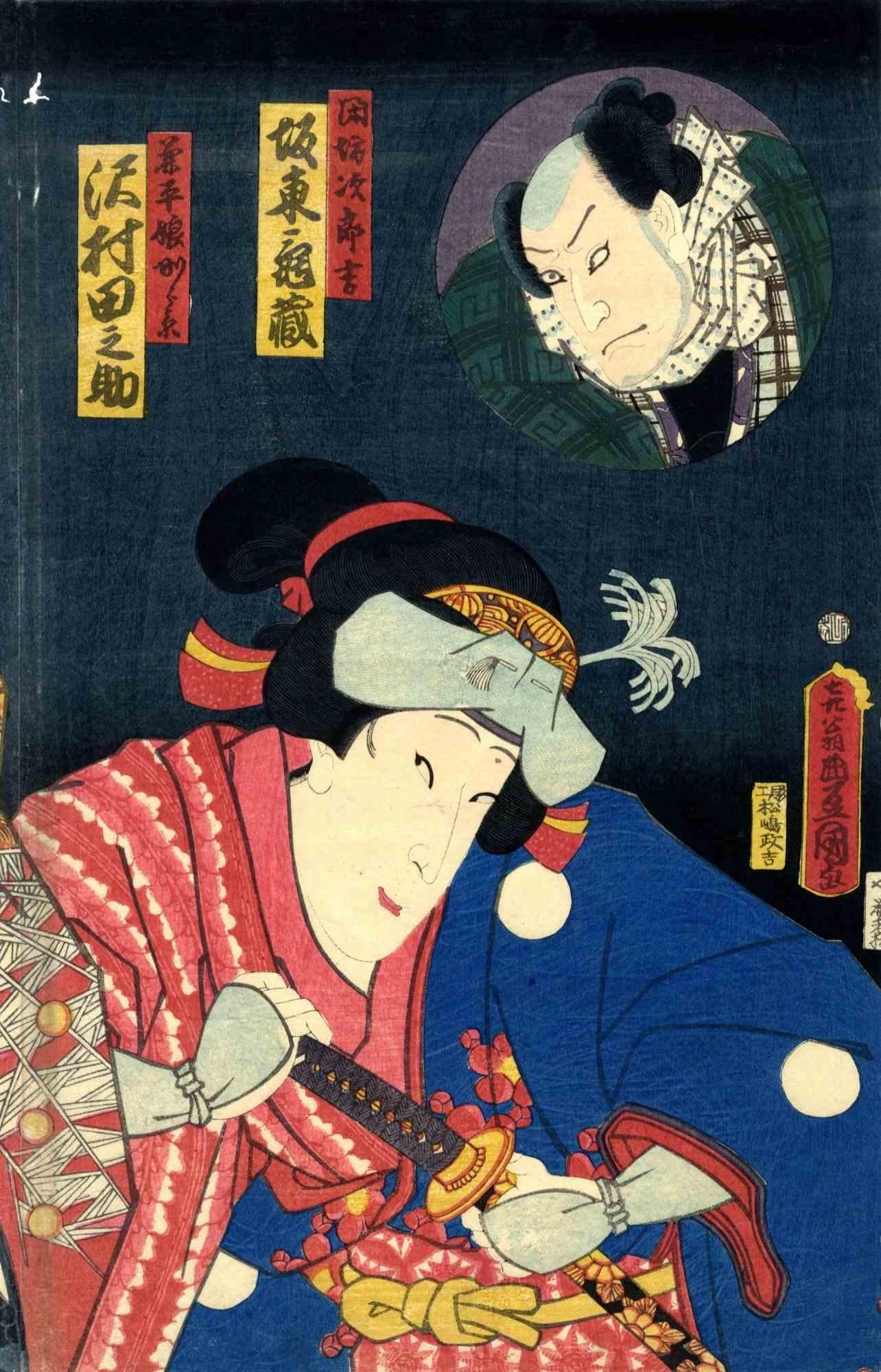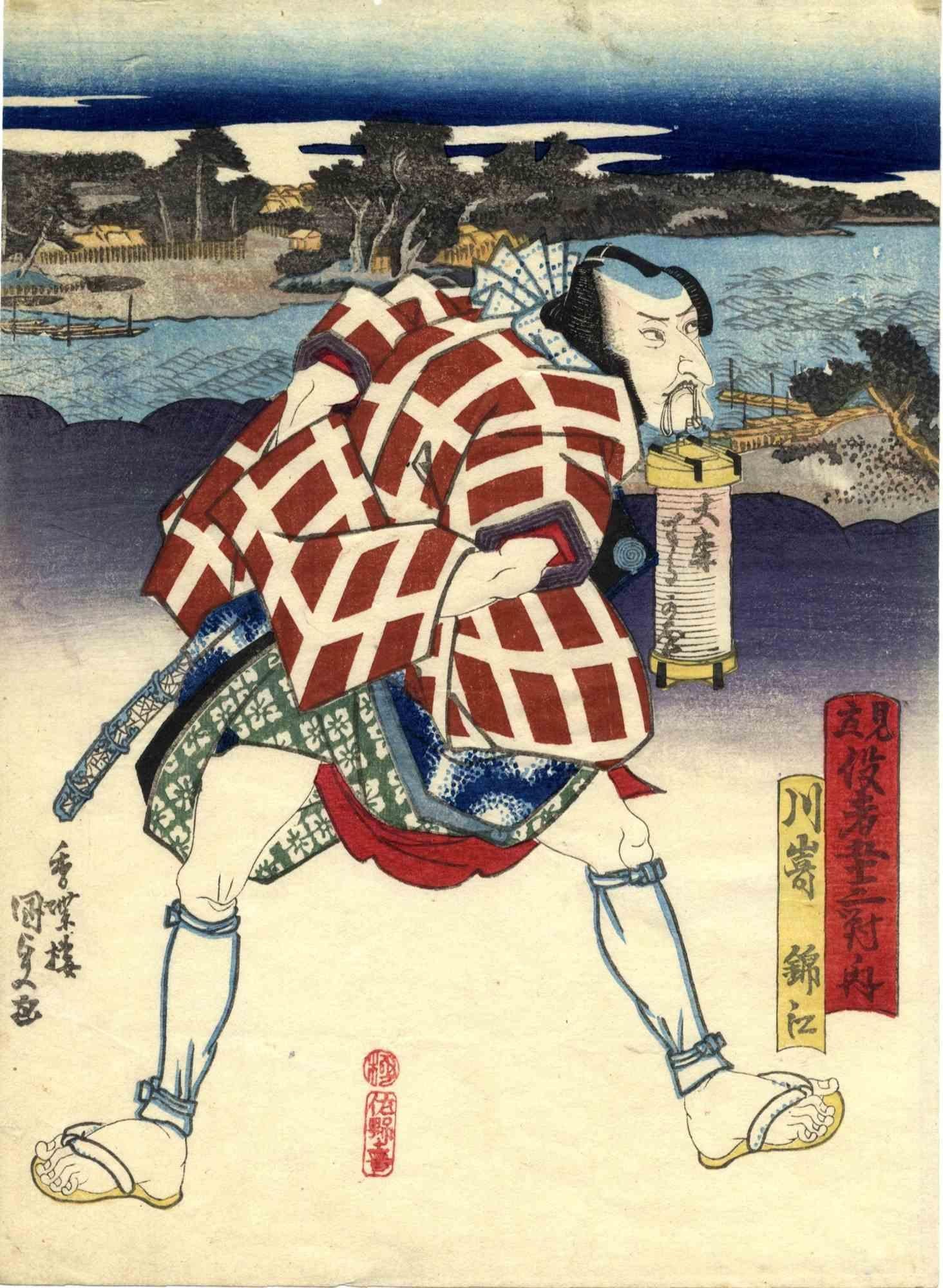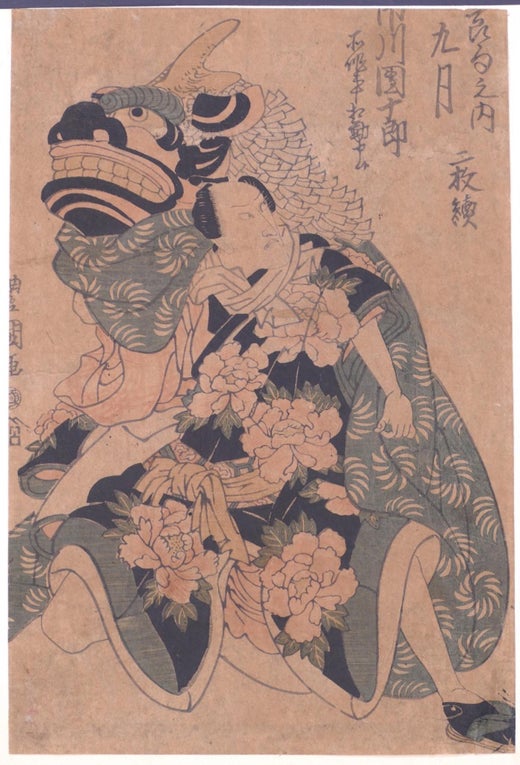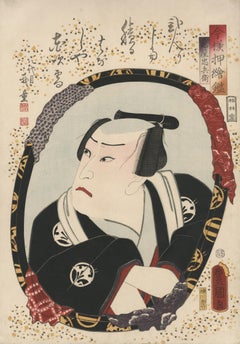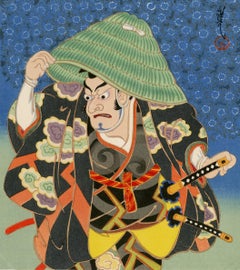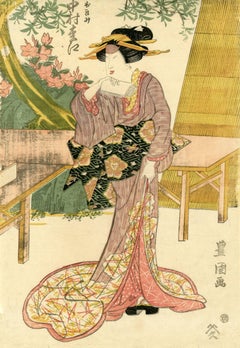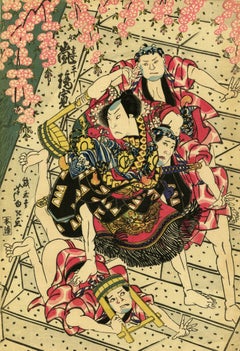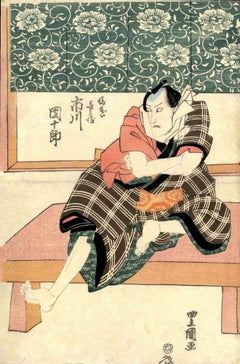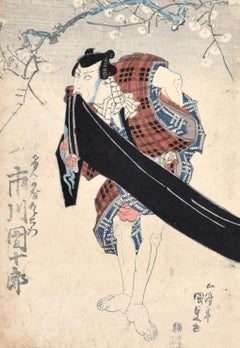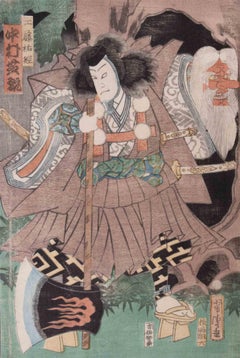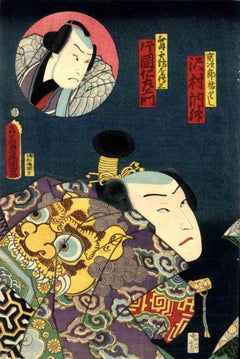Items Similar to Inari Kozo Tasaburo- Kabuki
Want more images or videos?
Request additional images or videos from the seller
1 of 11
Utagawa ToyokuniInari Kozo Tasaburo- Kabuki1820
1820
$900
£700.71
€796.91
CA$1,294.88
A$1,422.37
CHF 743.34
MX$16,962.99
NOK 9,412.71
SEK 8,768.74
DKK 5,954.88
About the Item
Inari Kozo Tasaburo- Kabuki
Color woodcut, c. 1820
Signed: ‘Toyokuni’
Publisher: ‘Yamamoto Heikichi’
Censor: Hama and Magome
Very good impression and color
Sheet/Image size: 15 1/2 x 10 5/8 inches
Note: Kabuki actor Ichikawa Monnosuke is in the role of Inari Kozo Tasaburo. He swam the river and is wringing his clothes at the riverbank. A scene from the play “Edo no Hana Mukashi Nishiki E” performed at Kawarazaki theater.
Utagawa Toyokuni I (1769-1825)
Toyokuni Utagawa was one of the great printmakers of the late 18th century who made himself known by his ukiyo-e of beautiful women and later of actors. As the head of the Utagawa school he was also the most influential man on the next generation of ukiyo-e designers.
Toyokuni was born the son of a puppet maker. He learned printmaking as a student of Toyoharu. At the beginning of his career he concentrated on bijin-ga - images of beautiful women. His early works were influenced by Kiyonaga and Shigemasa.
Toyokuni's success and fame came when he started making actor portraits and actor scenes. The Kabuki theaters were very crowded at that time and the best known actors were a kind of public icons. Consequently prints related to Kabuki were a hot business. Demand came from the theaters - for advertising material - and from the fans - in the form of actor portraits. The production of actor portraits was like today's publication of celebrity posters.
When the demand for actor prints grew faster than the master could design, the great moment of the Utagawa School had come. An ever increasing number of students produced actor prints and book illustrations. The Utagawa School was buzzing with commissions.
The Utagawa School flourished so well that Toyokuni Utagawa is sometimes mentioned as the founder of the Utagawa School, but that was actually Toyoharu. Toyokuni, however, was the one who made it big and who went into mass production. The comparison may be a bit daring. But basically the Utagawa School was something like the Andy Warhol factory of the Pop Art culture - at least in commercial terms.
The best known ukiyo-e students of the master Toyokuni Utagawa were Kunisada Utagawa and Kuniyoshi Utagawa. The tombstone of Toyokuni listed altogether 29 students.
After the death of Toyokuni in 1825, two of his pupils rivaled about who had the right to become his successor - the conceited Kunisada, who considered himself the greatest on earth anyway, and Toyoshige, a mediocre printmaker who had the advantage of having married his deceased master's daughter. The row about the succession to Toyokuni as the head of the Utagawa School was fought on arguments over who was the best ukiyo-e designer. But that was an argument on the surface. The real fight was about who got control of a flourishing business company - the Utagawa School.
Toyoshige won the fight but died in 1835. From 1844 on Kunisada called himself Toyokuni. In today's literature Kunisada is referred to as Toyokuni III, Toyoshige as Toyokuni II and the master as Toyokuni I.
Courtesy, Artelino Literature sources used for this biography:
• Richard Lane, Images from the Floating World (New York: Konecky & Konecky, 1978)
• Laurance P.Roberts, A Dictionary of Japanese Artists (New York: John Weatherhill Inc., 1976)
- Creator:Utagawa Toyokuni (1769 - 1825, Japanese)
- Creation Year:1820
- Dimensions:Height: 15.5 in (39.37 cm)Width: 10.63 in (27.01 cm)
- Medium:
- Period:
- Condition:
- Gallery Location:Fairlawn, OH
- Reference Number:Seller: UK22411stDibs: LU14013694512
Utagawa Toyokuni
Utagawa Toyokuni[a] (歌川 豊国; 1769 – 24 February 1825), also often referred to as Toyokuni I, to distinguish him from the members of his school who took over his gō (art-name) after he died, was a great master of ukiyo-e, known in particular for his kabuki actor prints. He was the second head of the renowned Utagawa school of Japanese woodblock artists, and was the artist who elevated it to the position of great fame and power it occupied for the rest of the nineteenth century.
He was born, the son of Kurahashi Gorobei, a carver of dolls and puppets, including replicas of kabuki actors.
At around 14, Toyokuni was apprenticed to the first head of the Utagawa house, Utagawa Toyoharu, whom his father knew well and who lived nearby.
One of his fellow pupils under Toyoharu was Toyohiro, whose pupil was the great landscape artist Hiroshige. In recognition of his artistic ability, Toyokuni later took the name Utagawa Toyokuni, following the common practice of using one syllable of his master's name.
Toyokuni seems not to have been an "intuitive genius"determined to forge a new path; rather, he seems to have studied intently those who came before him, particularly Utamaro, Chōbunsai Eishi and Eishōsai Chōki and through a great deal of hard work produced first a mastery, and then a synthesis of their styles, to create a style of his own.
He was known mostly for his prints related to the kabuki theatre, in particular his yakusha-e actor portraits, a field which he took to new heights. He also, however, produced other genres such as musha-e warrior prints, shunga erotica, and most notably bijin-ga.
In his actor prints, like Sharaku, one sees the real subject; but his prints merely portrayed what he saw, unlike Sharaku who exaggerated those aspects he saw as the most key. It is said of Toyokuni's prints that they recreate exactly what one would see on stage; they show actors acting, not merely just pictures of actors.
Together, these characteristics made Toyokuni's prints far more popular among theatre-goers than Sharaku's, although history has come to judge Sharaku the keener observer and greater artist.
His popularity and prolific output may in part have been his undoing, though. From 1803 through 1817, his work became more static, even as it became more popular. He continued to produce large quantities of prints, but the quality as a rule did not match that of his earlier days. Occasional prints from this period, however, show his old brilliance
About the Seller
5.0
Recognized Seller
These prestigious sellers are industry leaders and represent the highest echelon for item quality and design.
Gold Seller
Premium sellers maintaining a 4.3+ rating and 24-hour response times
Established in 1978
1stDibs seller since 2013
827 sales on 1stDibs
Typical response time: <1 hour
Associations
International Fine Print Dealers Association
- ShippingRetrieving quote...Shipping from: Akron, OH
- Return Policy
More From This Seller
View AllKataoka Nizayemon(?)
By Utagawa Kunisada (Toyokuni III)
Located in Fairlawn, OH
Exceptional, brilliant impression and colors from the extremely rare 1st edition
Kataoka Nizayemon(?)
Color woodcut, 1860
From the series: "Contemporary Brocade Mirror Portraits"
Pub...
Category
1860s Portrait Prints
Materials
Woodcut
Fuwa, Kabuki Actor
By Masamitsu Ota
Located in Fairlawn, OH
Fuwa, Kabuki actor
Color woodblock, 1931
From: “Kabuki Jahachi-Ban” (Eighteen Kabuki Plays) by the Ichikawa Family
Publisher: Gekiga Kanko Kai
Carver: Okura Hanbei
Printer: Shinmi Yo...
Category
1930s Other Art Style Figurative Prints
Materials
Woodcut
Beauty Otami - Kabuki
By Utagawa Kunisada (Toyokuni III)
Located in Fairlawn, OH
Beauty Otami - Kabuki
Note: Kabuki actor Nakamura Matsue is in the role of courtesan otami. She is standing in front of a small tea shop in a garden.
Color woodblock, c. 1800-1810
Si...
Category
Early 1800s Portrait Prints
Materials
Woodcut
Arashi Rikan II in an Osaka Kabuki Scene
Located in Fairlawn, OH
Arashi Rikan II in an Osaka Kabuki Scene
Color woodcut, c. 1827
Signed middle left (see photo)
Titled upper left (see photo)
Format: oban
Publisher: Honsei
The actor, in character, d...
Category
1820s Other Art Style Figurative Prints
Materials
Woodcut
Courtesan Kumekichi
By Utagawa Kunisada (Toyokuni III)
Located in Fairlawn, OH
Courtesan Kumekichi
Color woodblock, 1858
Kabuki Actor Iwai Kumesaburo III in the role of courtesan Kumekichi, who is standing in snow hold a red sake cup
Publisher: Ohkuniya Kinjiro...
Category
1850s Other Art Style Figurative Prints
Materials
Woodcut
Dangerous: The Appearance of a Contemporary Geisha of the Meiji Era
By Taiso Yoshitoshi
Located in Fairlawn, OH
Dangerous: The Appearance of a Contemporary Geisha of the Meiji Era
Color woodcut, 1888
Plate 28 from the series "Thirty-two Aspects of Customs and Manners" (Fuzoku Sanjuniso)
Format...
Category
1880s Figurative Prints
Materials
Woodcut
You May Also Like
Ichikawa Danjuro in the Role of Chobei - Woodcut by Utagawa Toyokuni - 1810s
By Utagawa Toyokuni
Located in Roma, IT
Ichikawa Danjuro in the role of Chobei is an original modern artwork realized by Utagawa Toyokuni (Edo, 1769 – Edo, 1825).
Original Woodcut Print.
Oban from a Triptych, around 1810.
The actor Ichikawa Danjuro sitting on a bench and fretting, behind him a green curtain with peony motif.
Signed: Toyokuni ga. Publisher: Yamamotoya Heikichi.
Excellent impression, cut, centrefold, a little bit rubbed and soiled.
Utagawa Toyokuni (Edo, 1769 – Edo, 1825), also often referred to as Toyokuni I...
Category
1810s Modern Figurative Prints
Materials
Woodcut
Kabuki Actor - Original Woodcut by Utagawa Kunisada - 1830 ca.
By Utagawa Kunisada (Toyokuni III)
Located in Roma, IT
Kabuki actor is a superb colored woodblock print realized around 1830 by one of the most famous Japanese Ukiyo-e artists Utagawa Kunisada, also known as Utagawa Toyokuni III (1786 - ...
Category
1830s Modern Figurative Prints
Materials
Woodcut
Kabuki Actor - Woodcut by Utagawa Kunisada - 1848/49
By Utagawa Kunisada (Toyokuni III)
Located in Roma, IT
Kabuki Actor is a woodcut print realized by Utagawa Kunisada in 1848/49.
Lifetime impression in very good condition, except for some very minor sign of time.
Category
1840s Modern Figurative Prints
Materials
Woodcut
Kabuki - Woodcut Print by Utagawa Kunisada - 1864
By Utagawa Kunisada (Toyokuni III)
Located in Roma, IT
Kabuki is an original artwork realized in 1864 by Utagawa Kunisada (1786-1865).
Breast portrait of the actor Sawamura Toshi in front of a dark blue background, he's wearing a lion dance costume. In the inset portrait of Kataoka Nizaemon with a feather costume.
Signed: Oshio Toyokuni ga (77 Toyokuni).
Publisher: Ebiya Rinnosuke in Horie. Censorship: Aratame. Wood engraver: Matsushima Masakichi.
Excellent impression with visible wood grain and baren print lines...
Category
1860s Modern Figurative Prints
Materials
Woodcut
Kabuki - Woodcut by Sawamura Tanosuke - 1862
By Sawamura Tanosuke
Located in Roma, IT
Kabuki is an original artwork realized in 1862.
Breast portrait of the actor Sawamura Tanosuke in front of a dark blue background, as Kanehira's daughter, in the inset portrait of B...
Category
1860s Modern Figurative Prints
Materials
Woodcut
Kabukie - Woodcut by Utagawa Kunisada - 1840
By Utagawa Kunisada (Toyokuni III)
Located in Roma, IT
Kabukie is an original artwork realized in 1840 by Utagawa Kunisada (1786-1865).
From the series "Mitate Yakusha gojusan tsui no uchi" (juxtaposition of actors and the 53 Tokaido s...
Category
1840s Modern Figurative Prints
Materials
Woodcut
